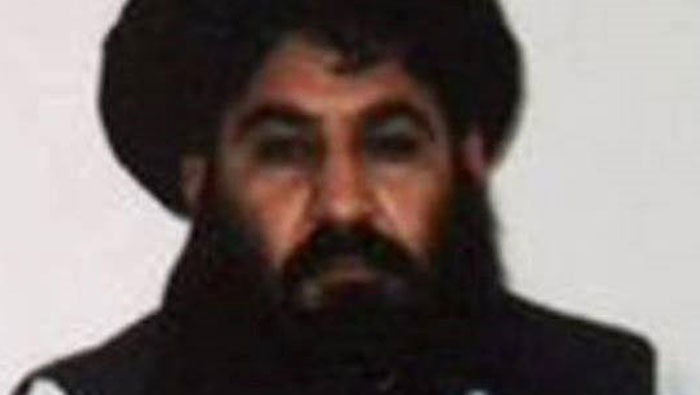
Kabul/Washington: The United States has killed the leader of the Afghan Taliban in an air strike in a remote border area just inside Pakistan, Afghanistan said on Sunday, in an attack likely to dash any immediate prospect for peace talks.
The death of Mullah Akhtar Mansour could trigger a battle for succession and deepen fractures that emerged in the insurgent movement after the death of its founder, Mullah Mohammad Omar, was confirmed last year, more than two years after he died.
Saturday's strike, which US officials said was authorised by President Barack Obama and included multiple drones, showed the United States was prepared to go after the Taliban leadership in Pakistan, which the Western-backed government in Kabul has repeatedly accused of sheltering the insurgents.
It also underscored the belief among US commanders that under Mansour's leadership, the Taliban have grown increasing close to militant groups like Al Qaeda, posing a direct threat to US security.
The United States has not confirmed Mansour's death but Afghan government chief Executive Abdullah Abdullah, and the country's top intelligence agency, said he had been killed.
"Taliban leader Akhtar Mansour was killed in a drone strike... His car was attacked in Dahl Bandin," Abdullah said in a post on Twitter, referring to a district in Pakistan's Balochistan province just over the border with Afghanistan.
US Secretary of State John Kerry said the United States had conducted a precision air strike that targeted Mansour "in a remote area of the Afghanistan-Pakistan border".
Mansour posed a "continuing, imminent threat" to US personnel and Afghans, Kerry told a news conference while on a visit to Myanmar.
"If people want to stand in the way of peace and continue to threaten and kill and blow people up, we have no recourse but to respond and I think we responded appropriately," Kerry said.
The Taliban have made no official statement but two commanders close to Mansour denied he was dead.
With the report of Mansour's death, attention has focused on his deputy, Sirajuddin Haqqani, leader of a notorious network blamed for most big suicide attacks in Kabul.
"Based purely on matters of hierarchy, he would be the favourite to succeed Mansour," said Michael Kugelman, a senior associate at the Woodrow Wilson Institute think-tank.
Haqqani, appointed as number two after Mansour assumed control of the Taliban last year, has generally been seen as opposed to negotiations.
Efforts to broker talks between the Afghan government and the Taliban had already stalled following a suicide attack in Kabul last month that killed 64 people and prompted President Ashraf Ghani to prioritise military operations over negotiations.
Ghani's office said on Sunday Taliban who wanted to end bloodshed should return from "alien soil" and join peace efforts.
Kerry said the leaders of both Pakistan and Afghanistan were notified of the Saturday air strike but he declined to say if they were told before or after it had been carried out. He said he had spoken to Pakistani Prime Minister Nawaz Sharif by telephone.
Pakistan has in the past denounced US strikes on its soil, calling them a violation of sovereignty, but US officials have said Pakistan has approved some strikes, in particular on militants fighting the Pakistani state.
Pakistan, which has been trying to broker Afghan talks, was "seeking clarification" on the strike, a foreign ministry spokesman said. He repeated a call for the Taliban to shun violence and join negotiations.
Drones targeted Mansour and another combatant in a vehicle in a remote area of Balochistan, southwest of the town of Ahmad Wal, a US official in Washington said, speaking on condition of anonymity.
A Pakistani official in the area said a car had been blown up and two unidentified people had been killed.
It was not clear how the vehicle was blown up and the two bodies had been taken to a hospital, said the official, who declined to be identified.
One of the Taliban commanders who dismissed the report of Mansour's killing said it had nevertheless spread alarm.
"This rumour has created panic among our followers across Afghanistan and Pakistan," the senor Taliban member said by telephone, adding he was telling his comrades to ignore the report.
In December, Mansour was reportedly wounded and possibly killed in a shootout at the house of an insurgent leader in Pakistan. The Taliban eventually released an audio recording, purportedly from Mansour, to dispel the reports.
A US intelligence analyst said Mansour had been in a power struggle with another commander whose deputy was killed last year in what officials think was a fight with Mansour's faction.
But the US official cautioned against concluding that a shakeup might diminish the Taliban's broader sense of strength, given recent gains they had made.
"It's hard to see much incentive for them to start compromising now, with the fighting just heating up again," the official said.
Meanwhile, rockets fired in the western Afghan city of Herat on Sunday hit a wall of the provincial governor's building and nearby houses, killing at least one civilian, a Reuters witness and a local official said.
General Majeed Rozi, Herat's chief of police, confirmed that at least three rockets had been fired at the governor's building where a meeting on security was being held.